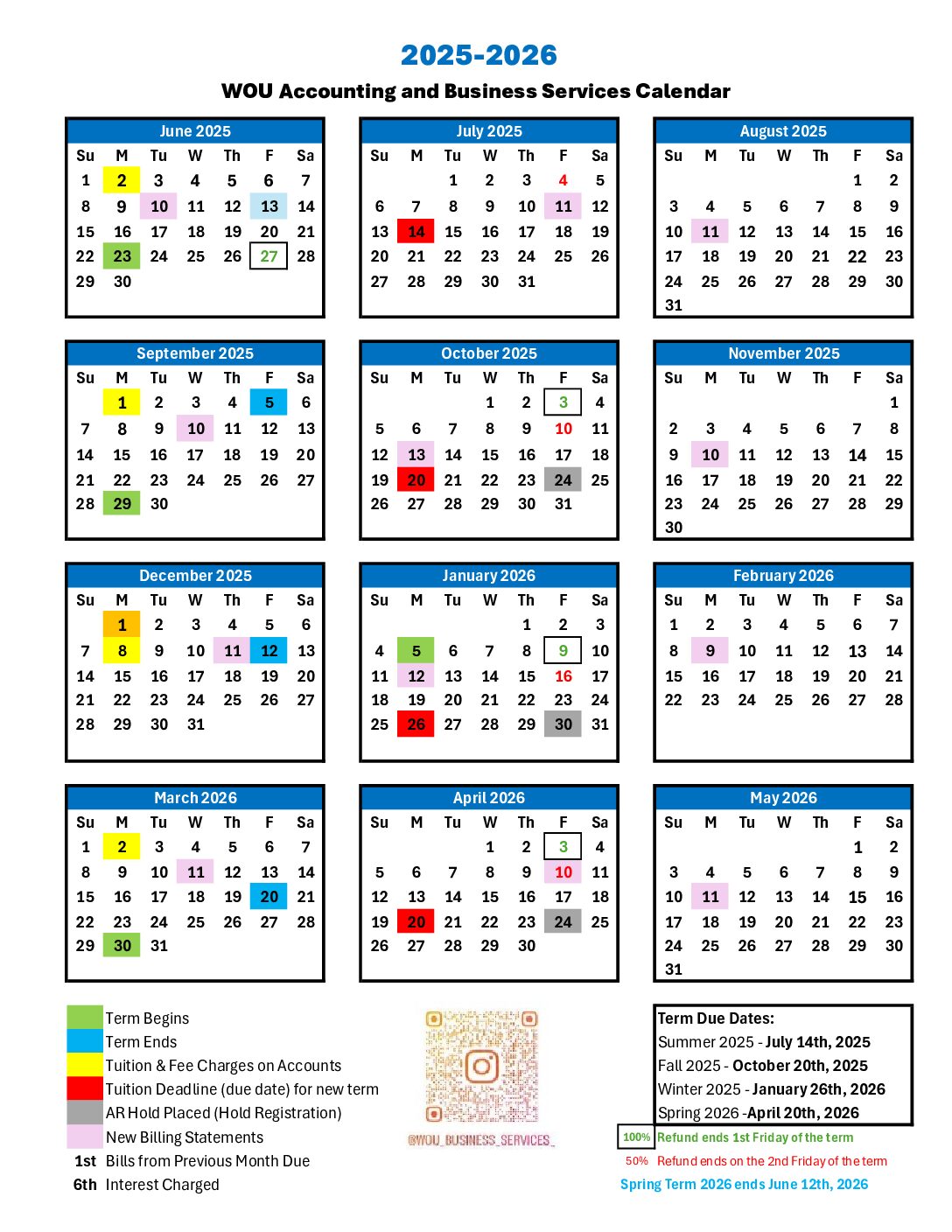Payment Information
Students are expected to have all current term charges paid by the designated due dates listed above (unless they are using the revolving charge program for the term). This includes all tuition, fees, housing charges, insurance, etc., that may have been added after the term begins. Failure to receive a billing is not an acceptable excuse for late payment.
The academic calendar provides other important deadlines that may be of interest.
Academic year tuition includes the following mandatory fees:
Tuition, building, health service building fee, incidental, technology, health and wellness recreation center building fee, and health service. Instruction fees are established to provide support for the cost of instructional expenditures. Building fees are used to repay building fee debt service. The health service building fee is used to repay the student health building debt service. The incidental fee supports student union activities, athletic activities, and educational, cultural and student government activities. The technology fee is a resource fee in support of the maintenance and enhancement of technology. The health and wellness center building fees are used to repay health and wellness center building debt service. The health service fee gives students access to the Student Health and Counseling Centers. The Matriculation Fee is a one time fee that all admitted students must pay to matriculate into the University.
Tuition and Regular Fees:
Notice is hereby given that by definition, any person who holds a degree from an accredited college or university is considered to be a graduate student for fee purposes, with the exception of formally admitted graduate students who have been admitted as a Post Baccalaureate Nongraduate declaration. These students are limited to enrollment in undergraduate courses.
Students as full-time with Less than 12 credits:
It is Western’s policy to recognize there are times that some students will be in a situation that necessitates a full-time course load at less than 12 credits. A student shall be considered full-time when registered for less than 12 credits when said student is identified by an authority on campus as needing this service. Authority shall include but not be limited to the President, the Provost, and the Director of Disability Services. The Registrar will have on file a record of all students each term who fall within this status. Students who have been identified, with reason, as being full-time while taking less than 12 credits shall enjoy all the benefits of a regular full-time student. Federal statute requires that for Federal Financial Aid purposes a full-time course load is considered to be 12 credits for undergraduates/post baccalaureates and 9 credits for a graduate student working towards a Master’s program. With Reason shall include but not be limited to an accommodation for a student with a disability. Benefits shall include but not be limited to eligibility for Western Scholarships based on GPA status, Dean’s list, and access to services based on full-time status.
Revolving charge program:
When a student’s requested class schedule has been confirmed the registration process is complete and a valid accounts receivable may be accrued by this institution. Western requires all students to complete a Revolving Charge Account Plan Contract to be kept on file in Accounting & Business Services. For any term that you do not pay in full on the first designated due date in the Class Schedule on the Academic Calendar, you will be assessed a $12.00 service charge. The option to pay in full by the tuition deadline always exists. Subsequent payments are always due on the first of the following month. Interest is charged on any unpaid balance at the rate of .75 percent per month, or fraction thereof (9% APR). To be considered a fully enrolled student at least one-third of all the current term charges plus any past due balance must be paid by the tuition deadline. Any charges owing from a prior term will have to be paid before a student will be able to register for subsequent terms. A more detailed statement of policy is available in Accounting & Business Services.
Fee refunds:
The tuition refund schedule for complete withdrawal, cancellations and course load reduction can be found on the Refund Schedule website. The tuition refund schedule is in effect even if you have not paid or attended classes. You must drop all of your courses prior to the start of the term to NOT be responsible for tuition. Students must officially withdraw or cancel whether or not they attend classes. All refunds are determined by the date of the dropped courses, and are based on calendar days.
Any claim for refund, other that those indicated above, must be made in writing before the close of the term in which the claim originated. Exceptions to the refund schedule may be made by Business Services in those cases where circumstances exist which are beyond the control of the student. In no case will a refund exception be made more than one term beyond the term in which the claim originated. Refund policy examples are available in Accounting & Business Services. Any refunds will be used to repay unpaid amounts due the University before any money is forwarded to the student. Note: Western Oregon University reserves the right to change refund dates and/or percentages without notice.
Collection efforts:
Western Oregon University is “…responsible for exercising diligence in collecting accounts and notes receivable.” Actions that may be taken to meet that requirement include but are not limited to:
- Cancellation or denial of registration
- Cancellation of future accounts receivable privileges
- Application of any refund toward debts with other State Public Universities
- Late penalties and interest
- Offset procedures with other state agencies
- Submission of the debt to the Department of Revenue or an outside collection agency for collection efforts
- Reporting account delinquency to Credit Bureaus


